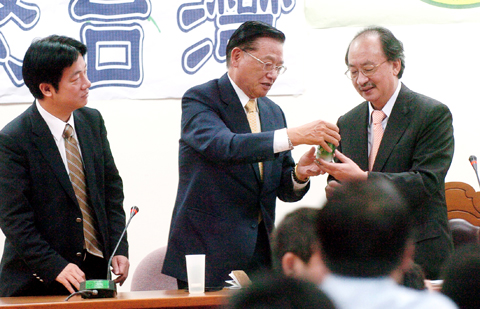Taiwan has already lost out to China even before it enters into formal negotiations with Beijing next week, said former Mainland Affairs Council (MAC) chairman Chen Ming-tong (陳明通) yesterday, expressing his pessimism about the KMT administration’s strategy on cross-strait issues.
“Frankly, it is heartbreaking to see what the new administration has done to what we [the Democratic Progressive Party (DPP) government] had so painstakingly established in the last eight years,” he said in a meeting with the press.
Chen, a major figure in the talks on direct-charter flights during the DPP era, said after extensive negotiations with Beijing, his team had successfully clinched direct cargo flights but the Chinese Nationalist Party (KMT) surrendered these soon after the party took power this March.

PHOTO: LO PEI-DER, TAIPEI TIMES
“Direct cargo flights benefit Taiwan more than they benefit China and that’s why Beijing was very reluctant about agreeing to them. But we insisted very strongly that all three [direct passenger and cargo flights and opening Taiwan for Chinese tourists] must be bound together,” Chen said, letting out a sigh.
“It is like someone giving you a piece of candy that has one-third of it missing and the missing part is the chocolate cover, the best part of the candy,” he said.
The quasi-official Straits Exchange Foundation (SEF), however, is slated to meet with its Chinese counterpart, the Association on Relations Across the Taiwan Strait (ARATS), in Beijing to sign a deal on only two issues — commencing direct weekend passenger-flights and allowing Chinese tourists to come to Taiwan by next month.
“Now the KMT has abandoned the cargo flights. What will Taiwan do next to get them back?” he asked rhetorically, saying the KMT had dug their own grave because “it was the KMT that trashed all the existing communication channels when it took office.”
“Since the KMT was the one that wanted to start the negotiation process from scratch with a brand new team of negotiators, the Chinese are not obliged to continue to honor the commitments it made in the previous negotiations,” he said.
MAC Deputy Chairman Fu Tung-cheng (傅棟成), however, argued that the government had not “lost” cargo flight as accused, but rather cargo flights have been temporarily halted because of recent fuel hikes.
Chen said this was nonsense and that if increased oil prices were the cause of the suspension of cargo flights, then passenger flights should be suspended as well.
Chen said the next thing to watch is the content of the joint declaration that SEF and ARATS are expected to sign next week.
Chen, who has returned to his teaching post at National Taiwan University, predicted Beijing would manipulate the content of the declaration by including the agreement signed in 2005 between then KMT chairman Lian Chan (連戰) and Chinese President Hu Jintao (胡錦濤) in his capacity as the Chinese Communist Party leader.
Among the five-point “vision for cross-strait peace” agreement inked between Lien and Hu, both parties oppose Taiwanese independence.

Chinese Nationalist Party (KMT) Chairman Eric Chu (朱立倫), spokeswoman Yang Chih-yu (楊智伃) and Legislator Hsieh Lung-chieh (謝龍介) would be summoned by police for questioning for leading an illegal assembly on Thursday evening last week, Minister of the Interior Liu Shyh-fang (劉世芳) said today. The three KMT officials led an assembly outside the Taipei City Prosecutors’ Office, a restricted area where public assembly is not allowed, protesting the questioning of several KMT staff and searches of KMT headquarters and offices in a recall petition forgery case. Chu, Yang and Hsieh are all suspected of contravening the Assembly and Parade Act (集會遊行法) by holding

PRAISE: Japanese visitor Takashi Kubota said the Taiwanese temple architecture images showcased in the AI Art Gallery were the most impressive displays he saw Taiwan does not have an official pavilion at the World Expo in Osaka, Japan, because of its diplomatic predicament, but the government-backed Tech World pavilion is drawing interest with its unique recreations of works by Taiwanese artists. The pavilion features an artificial intelligence (AI)-based art gallery showcasing works of famous Taiwanese artists from the Japanese colonial period using innovative technologies. Among its main simulated displays are Eastern gouache paintings by Chen Chin (陳進), Lin Yu-shan (林玉山) and Kuo Hsueh-hu (郭雪湖), who were the three young Taiwanese painters selected for the East Asian Painting exhibition in 1927. Gouache is a water-based

Taiwan would welcome the return of Honduras as a diplomatic ally if its next president decides to make such a move, Minister of Foreign Affairs Lin Chia-lung (林佳龍) said yesterday. “Of course, we would welcome Honduras if they want to restore diplomatic ties with Taiwan after their elections,” Lin said at a meeting of the legislature’s Foreign Affairs and National Defense Committee, when asked to comment on statements made by two of the three Honduran presidential candidates during the presidential campaign in the Central American country. Taiwan is paying close attention to the region as a whole in the wake of a

OFF-TARGET: More than 30,000 participants were expected to take part in the Games next month, but only 6,550 foreign and 19,400 Taiwanese athletes have registered Taipei city councilors yesterday blasted the organizers of next month’s World Masters Games over sudden timetable and venue changes, which they said have caused thousands of participants to back out of the international sporting event, among other organizational issues. They also cited visa delays and political interference by China as reasons many foreign athletes are requesting refunds for the event, to be held from May 17 to 30. Jointly organized by the Taipei and New Taipei City governments, the games have been rocked by numerous controversies since preparations began in 2020. Taipei City Councilor Lin Yen-feng (林延鳳) said yesterday that new measures by